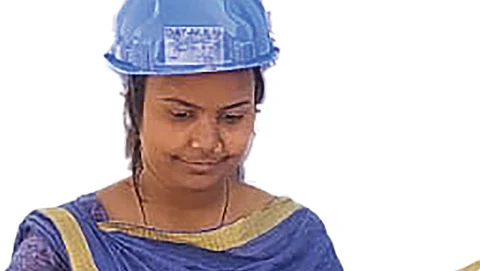

When Aparna Sahu joined the faecal sludge treatment plant (FSTP) in her city, Jaunpur, in March this year, her family and friends were less than supportive. “They had concerns over my safety as well as the social implications of working with faecal sludge. They assumed I would work for a couple of days and quit,” recalls Sahu, a sociology graduate. But now, as she nears six months as a supervisor at the plant, all doubts have vanished. “The confidence and financial stability I have earned has changed opinions,” she says.
Like Sahu, 15 other women work at FSTPs in Jaunpur, Sitapur, Raebareli and Khurja in Uttar Pradesh. They belong to different self-help groups (SHGs), which the Union government has involved in its AMRUT (Atal Mission for Rejuvenation and Urban Transformation) Mitra programme for water management initiatives.
The AMRUT scheme funds 54 of the 59 septage treatment plants (FSTPs and co-treatment units) in Uttar Pradesh. “Operations and maintenance are the biggest challenges,” says P K Srivastava, Additional Mission Director, AMRUT, Uttar Pradesh. “As of now, 18 plants do not even have any arrangement this work,” he says. After the Union Ministry of Housing and Urban Affairs launched the AMRUT Mitra programme in February, the Uttar Pradesh government decided to close the gaps. AMRUT officials roped in the State Urban Development Agency (SUDA) to hold an exposure session for SHGs, after which the 16 women shortlisted were trained by Delhi-based think tank Centre for Science and Environment. They learned about different processes at FSTPs, safety measures and operating the technologies. “During the training, the officials also showed us videos of women in Odisha who had joined FSTPs under the AMRUT Mitra programme. I realised then that if they can do the work, so can I,” adds Poonam Tripathi, supervisor of the Raebareli FSTP.
The women then split into four-member teams—one supervisor, two sanitation workers and one gardener. “The initial days were difficult, but slowly we picked up the work. After seeing the protection measures at the plants, even my family is less concerned,” says Tanya, supervisor at the Khurja FSTP.
The state government transfers a monthly honorarium of Rs 12,000 for the supervisor and Rs 10,000 for the others. “Earlier when I was a part of the SHG, I made and sold pickles and papads from home. My earnings depended on the demand. But working at the FSTP has provided income stability,” says Tripathi.
“After Odisha, Uttar Pradesh is the second state to rope in women from SHGs. We see that the women are more than capable for the work, and are looking to engage more,” says Srivastava.
This article was originally published in the September 16-30, 2024 print edition of Down To Earth